|
|
|
Sort Order |
|
|
|
Items / Page
|
|
|
|
|
|
|
| Srl | Item |
| 1 |
ID:
137374
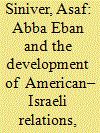

|
|
|
|
|
| Summary/Abstract |
Abba Eban, Israel’s ambassador in Washington and representative at the United Nations from 1950 to 1959, had a central role in the transformation of American–Israeli relations during a period of frequent discord over key strategic issues. This analysis examines the influence of one prominent actor upon bilateral ties that would eventually become the American–Israeli “special relationship.” Eban’s oratory talent, linguistic skills, and effective style of diplomacy augmented both Israel’s image in the view of the American public and relations with official Washington. The article explores several critical elements of these relations during the 1950s, re-examining both Eban’s involvement in events such as Israel’s approach toward the problem of borders, its policy of military retaliation, and the response to severe American pressure following the 1956 Sinai campaign. Whilst not attributing the development of close relations between the two Powers solely to the works of a single individual, evidence suggests that Eban was the right man in the right place and time to provide the necessary foundations for the elevation of American–Israeli relations to “special” in the following decade.
|
|
|
|
|
|
|
|
|
|
|
|
|
|
|
|
| 2 |
ID:
137717
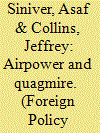

|
|
|
|
|
| Summary/Abstract |
This paper assesses the role that analogical reasoning played in Israel's decision making during the 2006 Second Lebanon War with Hezbollah. Two analogies seemed to dominate internal deliberations: the “air power superiority” analogy which drew on more than a decade of developments in military theory and the air-based campaigns of the two Gulf wars and the Balkan wars of the mid-1990s and late 1990s; and the “Lebanese quagmire” analogy which drew on Israel's own traumatic experience of Israel following the its first war in Lebanon in 1982. The misuse of these analogies by the Israeli political–military leadership during the war produced a myopic approach which advocated an almost total reliance on air power rather than ground maneuver to win the war and refrained from using ground forces for fear of entering another bloody and unpopular war in Lebanon. The constraining power of these analogies prevented the consideration of alternative courses of action or the effective calculation of cost-benefit analysis during the war. Whereas previous studies of the war provided various explanations to singular decisions or episodes, this paper shows that the air power and quagmire analogies contained the conceptual boundaries of Israeli decision making during the war and thus best explain its attraction and limitations.
|
|
|
|
|
|
|
|
|
|
|
|
|
|
|
|
| 3 |
ID:
110206
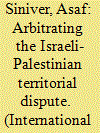

|
|
|
|
|
| Publication |
2012.
|
| Summary/Abstract |
This article presents the case for arbitrating the territorial dispute over the West Bank between Israel and the Palestinian Authority. After nearly two decades of intense intermediary activity but with still no signs of progress, and against the inability of the parties themselves to move towards reconciliation, the article argues that as a method of conflict resolution, mediation has exhausted its primary objective - namely the establishing of direct channels of communication between the disputants - and it is now time to examine alternative methods to conflict resolution. The article debunks the myths surrounding the success of American mediation in the conflict, and uses the historical case of the Taba arbitration between Israel and Egypt to demonstrate under what terms the arbitration of the West Bank dispute might be presented, while taking into consideration its advantages and drawbacks compared with the more established method of mediation in this conflict.
|
|
|
|
|
|
|
|
|
|
|
|
|
|
|
|
| 4 |
ID:
108888
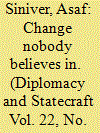

|
|
|
|
|
| Publication |
2011.
|
| Summary/Abstract |
Despite the promise of 'change' in President Barack Obama's early dealings with the Israeli-Palestinian conflict, the policy that has since emanated from the White House was in fact commensurate with those of preceding administrations. Rather than heralding a new direction for American engagement with the conflict, the Obama Administration had displayed more patterns of continuity than change in its dealings with both parties. Specifically, by continuing to act as "Israel's attorney" during negotiations, the Obama team had in effect negated the president's early pledges to act as an honest broker in the conflict. In assessing the (in)effectiveness of the Administration's management of the Israeli-Palestinian issue, it seems that on-going mediation efforts to revive the moribund peace process have exhausted their potential. Arbitration may be explored as a more effective method to resolve the Israeli-Palestinian territorial dispute.
|
|
|
|
|
|
|
|
|
|
|
|
|
|
|
|
| 5 |
ID:
097390
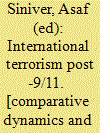

|
|
|
|
|
| Publication |
Oxon, Routledge, 2010.
|
| Description |
xv, 240p.
|
| Standard Number |
9780415552301, hbk
|
|
|
|
|
|
|
|
|
|
|
|
Copies: C:2/I:0,R:0,Q:0
Circulation
| Accession# | Call# | Current Location | Status | Policy | Location |
| 055041 | 363.3251561/SIN 055041 | Main | On Shelf | General | |
| 056707 | 363.3251561/SIN 056707 | Main | On Shelf | General | |
|
|
|
|
| 6 |
ID:
145265
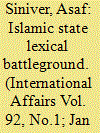

|
|
|
|
|
| Summary/Abstract |
This article suggests that President Obama's consistent references to the extremist Sunni group as ‘ISIL’ (Islamic State of Iraq and the Levant) is not a trivial matter of nomenclature. Instead, the Obama administration's deliberate usage of the ISIL acronym (as opposed to other commonly-used terms such as ‘Islamic State of Iraq and Syria’ or ‘ISIS’, ‘Islamic State’, ‘IS’, ‘so-called Islamic State’ and ‘Daesh’) frames the public perception of the threat to avoid engagement with the requirements of strategy and operations. Both the labelling and the approach could be defended as a response to the unique challenge of a transnational group claiming religious and political legitimacy. However, we suggest that the labelling is an evasion of the necessary response, reflecting instead a lack of coherence in strategy and operations—in particular after the Islamic State's lightning offensive in Iraq and expansion in Syria in mid-2014. This tension between rhetoric, strategy and operations means that ‘ISIL’ does not provide a stable depiction of the Islamic State. While it may draw upon the post-9/11 depiction of ‘terrorism’, the tag leads to dissonance between official and media representations. The administration's depiction of a considered approach leading to victory has been undermined by the abstraction of ‘ISIL’, which in turn produced strategic ambiguity about the prospect of any political, economic or military challenge to the Islamic State.
|
|
|
|
|
|
|
|
|
|
|
|
|
|
|
|
| 7 |
ID:
178451
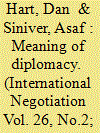

|
|
|
|
|
| Summary/Abstract |
This article draws on interviews with 198 state ambassadors and applies an interpretivist lens to provide a more nuanced conceptualization of diplomacy. In doing so, we seek to project a closer fit between scholarly definitions of the term and how diplomacy is understood by practitioners. We contribute to the literature by proposing a more refined understanding of the term, presented here as five distinct (though not mutually exclusive) ‘meanings’ of diplomacy: (1) The actors taking part in modern diplomacy; (2) the objectives of diplomacy; (3) the mechanisms of diplomacy; (4) diplomacy as a skill; and (5) diplomacy as a profession. We find that drawing on the full range of the diplomatic experience is particularly important given the growing challenges to negotiation as the primary agency of diplomacy.
|
|
|
|
|
|
|
|
|
|
|
|
|
|
|
|
| 8 |
ID:
105644


|
|
|
|
|
| Publication |
2011.
|
| Summary/Abstract |
This article is concerned with a particular debate in mediation literature, revolving around the merit and necessity of power as a strategy employed by third parties in their efforts to negotiate a successful resolution to conflict. We argue that by subscribing to a one-dimensional spectrum of pure-to-power mediation, students of mediation have neglected the development of how power is conceptualised and operates within the changing dynamics of conflict and its mediation.
We therefore seek to redefine the concept of power mediation to project a closer fit between conflicting parties' understanding of their situation and the methods, aims and motivations of their mediators. Breaking away from the existing pure-power spectrum, we propose a heuristic framework that includes four distinct types of power mediation, defined here as real, made, critical and structural power. The contribution of our heuristic model is threefold. First, it assists us in asking the most basic question of social science research, 'of what is this a case', which in turn ought to lead to a more sophisticated observation of mediation instances. Concurrently, through the frame of 'power', it establishes common understanding of observable phenomena that makes the study of mediation more accessible to the wider audience beyond students of our modest literature. Finally, the synthesis of epistemological and ontological inquiry of conflict and power with the established International Relations (IR) approaches of realism(s), constructivism, critical discourse and structuralism, allows respective real, made, critical and structural types of mediation power to be tested.
|
|
|
|
|
|
|
|
|
|
|
|
|
|
|
|
| 9 |
ID:
168799


|
|
|
|
|
| Summary/Abstract |
More than three decades after the concept of international regimes was introduced, the study of why and how states may choose to cooperate, particularly around security, remains contested. While the field has evolved considerably over that time, there remain significant puzzles in the literature concerning the emergence of different types of security regimes. We aim to address these issues by developing the concept of a tacit security regime (TSR) literature. We define a TSR as an interest-based, limited, and informal mechanism of cooperation between states for the purpose of deconflicting their respective interests over a specific security issue. We illustrate the usefulness of our concept in the two contemporary cases of Russian-Israeli and Russian-Turkish security cooperation over the Syrian crisis (2015–2018).
|
|
|
|
|
|
|
|
|
|
|
|
|
|
|
|
|
|
|
|
|